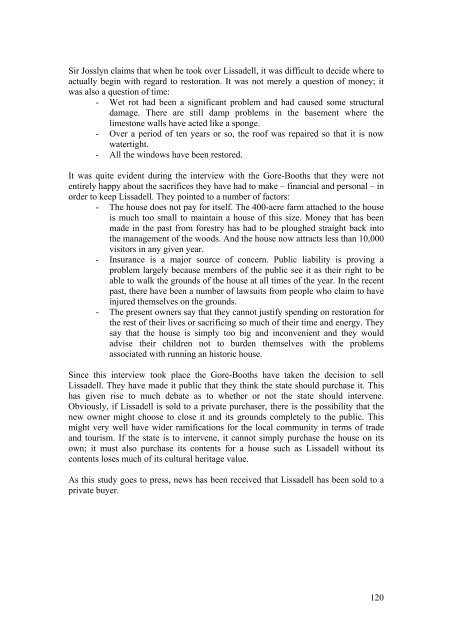A Future for Irish Historic Houses - Irish Heritage Trust
A Future for Irish Historic Houses - Irish Heritage Trust
A Future for Irish Historic Houses - Irish Heritage Trust
Create successful ePaper yourself
Turn your PDF publications into a flip-book with our unique Google optimized e-Paper software.
Sir Josslyn claims that when he took over Lissadell, it was difficult to decide where to<br />
actually begin with regard to restoration. It was not merely a question of money; it<br />
was also a question of time:<br />
- Wet rot had been a significant problem and had caused some structural<br />
damage. There are still damp problems in the basement where the<br />
limestone walls have acted like a sponge.<br />
- Over a period of ten years or so, the roof was repaired so that it is now<br />
watertight.<br />
- All the windows have been restored.<br />
It was quite evident during the interview with the Gore-Booths that they were not<br />
entirely happy about the sacrifices they have had to make – financial and personal – in<br />
order to keep Lissadell. They pointed to a number of factors:<br />
- The house does not pay <strong>for</strong> itself. The 400-acre farm attached to the house<br />
is much too small to maintain a house of this size. Money that has been<br />
made in the past from <strong>for</strong>estry has had to be ploughed straight back into<br />
the management of the woods. And the house now attracts less than 10,000<br />
visitors in any given year.<br />
- Insurance is a major source of concern. Public liability is proving a<br />
problem largely because members of the public see it as their right to be<br />
able to walk the grounds of the house at all times of the year. In the recent<br />
past, there have been a number of lawsuits from people who claim to have<br />
injured themselves on the grounds.<br />
- The present owners say that they cannot justify spending on restoration <strong>for</strong><br />
the rest of their lives or sacrificing so much of their time and energy. They<br />
say that the house is simply too big and inconvenient and they would<br />
advise their children not to burden themselves with the problems<br />
associated with running an historic house.<br />
Since this interview took place the Gore-Booths have taken the decision to sell<br />
Lissadell. They have made it public that they think the state should purchase it. This<br />
has given rise to much debate as to whether or not the state should intervene.<br />
Obviously, if Lissadell is sold to a private purchaser, there is the possibility that the<br />
new owner might choose to close it and its grounds completely to the public. This<br />
might very well have wider ramifications <strong>for</strong> the local community in terms of trade<br />
and tourism. If the state is to intervene, it cannot simply purchase the house on its<br />
own; it must also purchase its contents <strong>for</strong> a house such as Lissadell without its<br />
contents loses much of its cultural heritage value.<br />
As this study goes to press, news has been received that Lissadell has been sold to a<br />
private buyer.<br />
120


